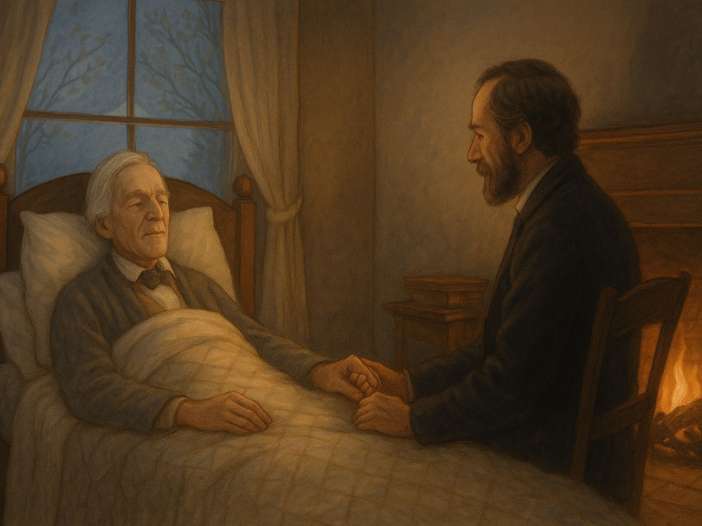
|
Getting your Trinity Audio player ready...
|
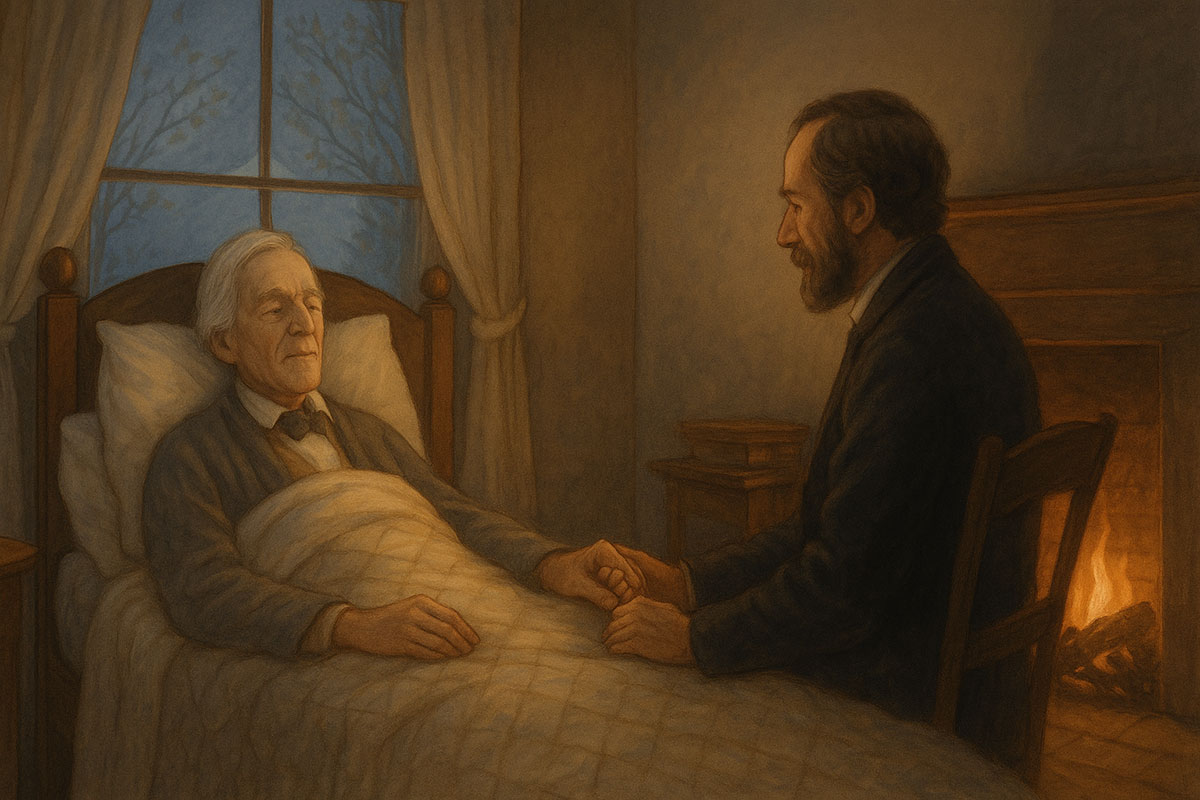
Margaret Fuller:
When I think of Ralph—my friend, my fellow sojourner in the realm of ideas—I do not think first of the essays, nor the applause, nor the stoic gaze he wore like a cloak against the shifting winds of public life. I think of a man who walked slowly, who listened deeply, who left space in his words for God to enter.
You will hear of his grief, his rebellion, his stillness, and his fire. But let me tell you this: Ralph did not seek fame, nor even peace. He sought truth—the kind that sits quietly in the corner of a room and waits for you to kneel beside it. The kind that trembles in silence, yet never lies.
In these final glimpses of his life, we do not recount a hero’s conquest, but a soul’s weathering. We see not a sage on a pedestal, but a man with paper in his lap and spring trees swaying outside his window. Come close. He is still speaking.
(Note: This is an imaginary conversation, a creative exploration of an idea, and not a real speech or event.)

Chapter 1: The Grief That Shaped His Soul
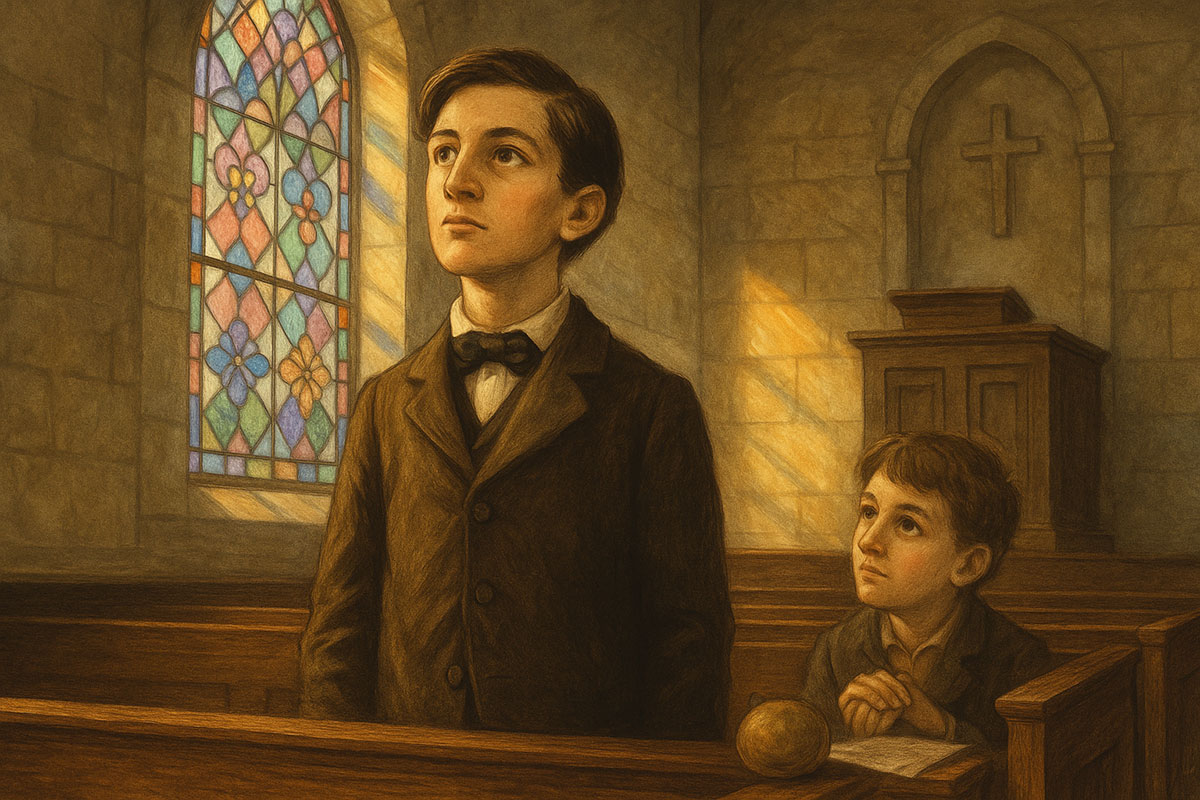
The air in Boston had turned damp and mournful, as if the sky itself mourned with him. In the candlelit silence of a parlor emptied of laughter, Ralph sat motionless, his long fingers wrapped around a folded handkerchief no longer needed. Ellen had passed. She had slipped through the veil with barely a whisper, leaving the room saturated with lavender and something far heavier—absence.
You found him sitting alone by the hearth, coat draped loosely around his slender frame, eyes gazing at the dying fire. He didn’t flinch when you entered. He didn’t need to. He knew your presence like he once knew her voice in the dark.
“She was light,” he murmured, voice dry as dust. “Even her suffering didn’t dim it.”
You sat beside him, not with words, but with shared stillness. The kind of silence only grief can shape—wide enough to hold a whole marriage, and fragile enough that any noise might break it.
Outside, snow gathered against the windowsill like prayers unsent. His journal lay nearby, but the ink had not moved in days. He stared at it the way a man stares at a well gone dry.
“Do you believe she still exists?” he asked suddenly. “Not in heaven, but in something... near?”
You didn’t answer with certainty. Instead, you placed a small violet you had found—one of her favorites—on the table beside him. A gesture, not a theory. He blinked slowly, and for a second, he seemed less hollow.
“She once said,” he whispered, “that she would leave something behind inside me... a seed of joy that could outlive even sorrow.”
He turned to you, the firelight catching the rims of his tired eyes. “But I can’t find it. I don’t know where she planted it.”
You leaned forward and said gently, “Perhaps it isn’t time for it to bloom yet.”
He didn’t reply, but the handkerchief fell from his fingers and rested on the floor. He finally reached for his journal. Just touched it. That was enough for today.
The following morning, you returned to find him by the window, bathed in pale light. The journal was open. A single line written in Ellen’s memory:
“Grief is a cloud that softens the sunlight—it changes everything, but does not extinguish it.”
When he looked at you, his face was still carved with sorrow, but his voice had returned.
“Maybe God is not outside us after all,” he said. “Maybe He waits in the quiet between loss and understanding.”
And there, with the first light creeping in, you saw the seed she had planted, barely sprouting, pushing its way toward the sky inside him.
Chapter 2: The Break with the Church
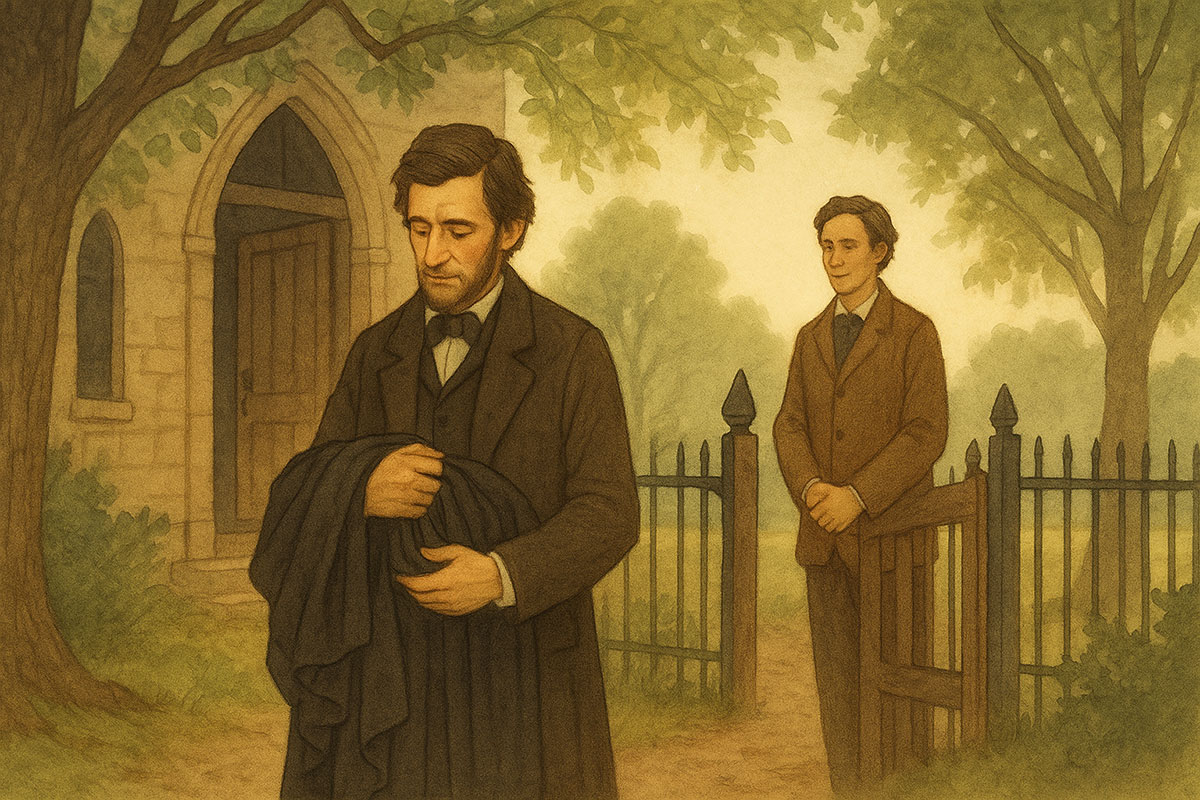
It was a gray Sunday morning when the silence inside the old church finally grew louder than the sermons. Emerson stood at the pulpit, but the words in the book no longer lived in his heart. The oak beams above seemed to echo not with hymns, but with the tension of a man about to leap—into doubt, into truth, into exile.
You sat quietly in the back pew, already sensing the storm forming inside him. His voice, when it came, was gentler than usual, not fiery or condemning. But it trembled—not with uncertainty, but with the ache of stepping away from something once sacred.
“I cannot speak the words I do not believe,” he said, his gaze not at the congregation, but through them. “The Lord’s Supper is not a ritual to me anymore. It must be a living act of conscience, not tradition.”
The room froze. Not from shock—but from fear. Fear that their minister was no longer theirs.
After the service, he sat in the vestry alone, hat untouched on the desk, collar unbuttoned. You entered without knocking. He didn’t look up.
“I loved this church,” he said. “I bled for it, long before I ever stood in its light. But now… I must walk beyond it. Even if it means walking alone.”
You knelt beside him. “Do you believe in God less now, Ralph?”
He looked at you with such raw conviction it stilled your breath. “No. I believe in Him more fiercely than ever. But I believe He speaks through the soul directly—not through wafers and wine, not through inherited words.”
A pause.
“But will they understand?” he asked, almost like a boy again. “Will they think I’ve betrayed them? Or worse—lost faith?”
You didn’t answer with logic. You pulled from your coat a small folded note—Ellen’s handwriting, saved all this time. “Always trust the voice that comes from stillness. Even if it calls you away.”
He read it, and the air around him shifted. The church outside was already whispering, already judging. But he no longer needed their approval. He stood, folded the note, and placed it in the breast pocket over his heart.
That evening, he wrote in his journal:
“The soul knows no Sabbath but sincerity. I will no longer wear robes stitched by other men’s beliefs.”
He resigned the next day.
But in the quiet that followed, you saw it: not a man in crisis—but one being born again, not into dogma, but into the infinite cathedral of his own conscience.
Chapter 3: The Solitude of Truth

The house was quiet that winter.
The pulpit was behind him. The public life too. Letters came, but not often—many were cold, some kind, most cautious. His friends in Boston whispered about “his strange turn,” and the clergy labeled him “lost to orthodoxy.” But it wasn’t their silence that cut deepest. It was the absence of Ellen.
You found him that afternoon by the window, his hand drifting across a closed volume of Montaigne, not reading—only remembering.
Outside, snow fell over Concord like pages torn from a white book, each flake a confession that never needed words. Inside, the hearth was warm, but Emerson’s shoulders were hunched, as if bracing against something colder than winter.
“They think I’ve chosen pride,” he said softly. “But it wasn’t pride. It was honesty. And honesty is lonelier than I imagined.”
You sat beside him in silence, letting your presence say what pity never could.
“I walk with God,” he whispered, “and yet, some days… I wonder if I’ve exiled myself from man.”
He turned to you suddenly, the flicker of pain too human for someone history would later call sage. “Do you think I was wrong to leave the church?”
You looked at him—this man who had dared to speak the truth of his soul, even when it cost him belonging—and you shook your head.
“Truth,” you said, “is rarely greeted with applause. More often, it arrives to an empty room. But it still stands.”
He smiled faintly. Then, almost childlike, he confessed: “I miss hearing my name in the pews. I miss the organ… and even the awkward handshakes after sermons. But most of all, I miss being needed.”
You poured tea for both of you—his cup untouched.
Then you leaned forward. “You are still needed. Just by different ears now. Not all who listen wear collars or sit in pews. Some walk alone too, wondering if they’re mad for questioning what they were told to believe. Your voice is for them.”
That night, he wrote again.
“The voice that echoes in solitude is not madness, but the earliest form of truth. I will not flee it. I will make my home beside it.”
And from that home beside truth, Nature was born.
Not as sermon, not as doctrine—but as hymn to the divine in every man’s heart, to the Oversoul humming behind every tree, every brook, every breath of solitude.
You did not celebrate. You only stayed near. Sometimes, presence is the only bridge between doubt and destiny.
Chapter 4: The Weight of Fame
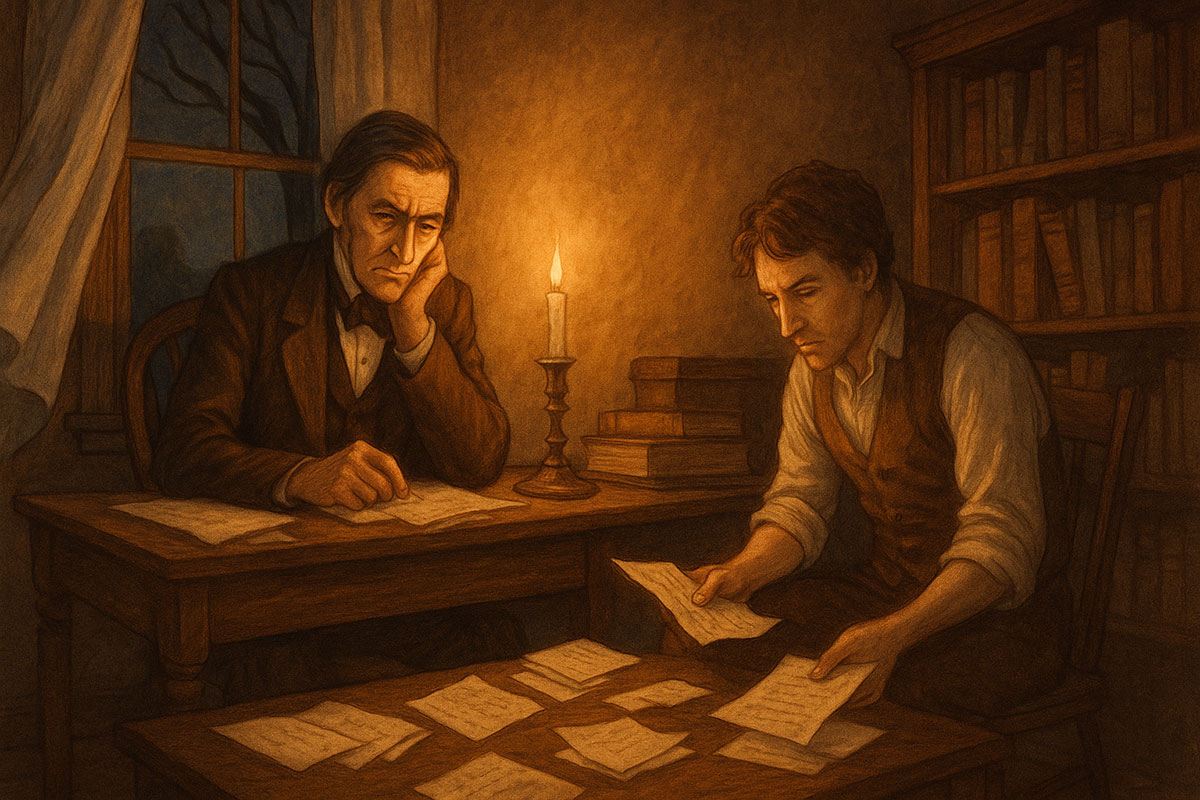
The hall was full. Men in coats too tight, women in gloves too white, and rows of restless students with ink on their fingers and stars in their eyes. They’d come to see him—the philosopher of Concord. The man who dared to say: Trust thyself.
And he delivered, as always, with the clarity of a mountain spring. His voice rang without thunder. It didn’t need to shout. It carried on a deeper wind—one that stirred thought, not noise.
But after the applause, after the handshakes and the murmurs of “genius” and “oracle,” you found him behind the curtain. Slumped in a plain wooden chair, wiping his glasses not for clarity, but to delay the moment.
He didn’t look pleased. He looked tired.
“They praise what they do not yet understand,” he said. “And so I worry I have failed.”
You crouched beside him. “You spoke plainly.”
“Yes. And they clapped anyway.” He let the cloth fall from his hand. “Do you know what frightens me? That they love the sound of my words more than the silence from which I drew them.”
The oil lamp flickered. A moth flailed against it—drawn to light it could not survive.
“They want answers,” he continued, “but I came only to offer mirrors. And sometimes, I think they only see themselves smiling back.”
You placed a hand on his shoulder. “Let them start there. You didn’t promise a map. You lit a candle.”
His eyes—always more lake than fire—glistened. “Do you think I’ve become the very institution I once resisted?”
“No,” you whispered. “You’ve become a window. They must still choose to look through it.”
He breathed deeply, as if trying to inhale humility again. The praise had its poison. It always did.
Later that night, you sat with him under the Concord stars. He read nothing. Wrote nothing. Just watched the constellations turn, as if seeking instruction from the only source that didn’t cheer.
You passed him a small apple from the orchard. He took a single bite, smiled at its tartness, and said, “Fame is sweet until it drowns the tongue. I must speak again from the woods.”
And so, the next morning, he walked barefoot into dew-soaked fields—not to prepare a lecture, but to remember the world that needed no audience.
Chapter 5: The Return to the Invisible
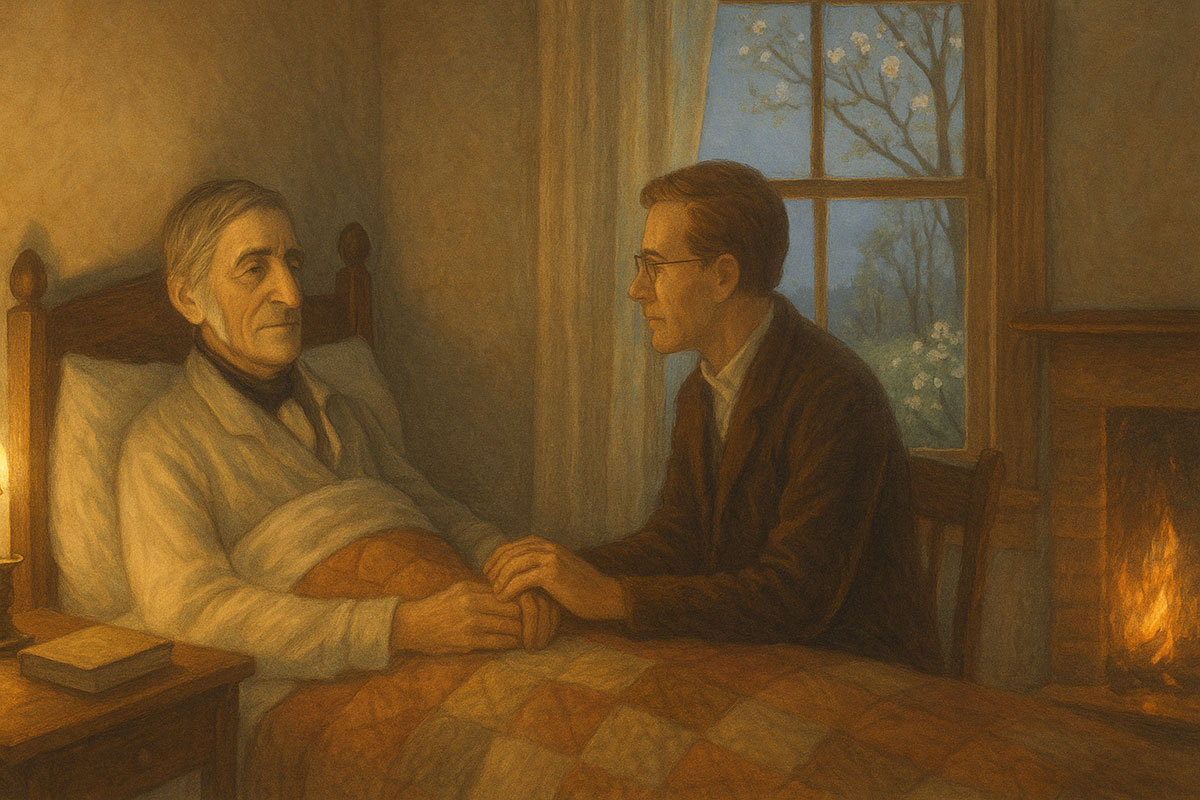
Gone were the ringing bells and urgent knocks of visitors eager to glean wisdom from his silence. Even the birds at the windowsill seemed to hush their morning songs as if the air itself understood that Emerson was nearing the edge of one world and listening, at last, for the whisper of another.
He lay beneath a quilt that smelled faintly of pine and lavender, the same one his wife had folded each winter for over forty years. The hearth still glowed—soft, not roaring—with a fire that asked for nothing and gave only warmth.
You sat beside him, your hand wrapped loosely around his. His breathing was shallow, steady. His gaze rested not on the ceiling, but beyond it, as though he were reading a verse inked in the sky.
“I have become forgetful,” he murmured, his voice thinner than parchment. “Words slip away… and then I realize… perhaps they are not meant to stay.”
You smiled gently. “You always said thoughts are guests, not tenants.”
He turned his head slightly toward you, the faintest ghost of a grin on his lips. “Did I? I suppose I once believed such things.”
“You still do,” you said. “You’re just remembering them from the other side now.”
There was a pause. And then, a fragile, tremulous joy filled his expression.
“I dreamed last night,” he said. “Waldo was there. He stood beneath the birch tree by the brook. He didn’t speak. He just smiled… and I woke crying, but it felt like grace.”
You nodded, your throat tight.
“I’ve spent so many years building sentences like bridges… and now I see, I was only ever learning how to cross.”
Outside the frosted window, the last leaves of April stirred. Light pooled in golden silence across the floorboards. A notebook lay open on the nearby table, untouched for days. A feather rested atop it, placed there by you.
“I don’t fear the dark,” he whispered. “I only hope I remember how to love in it.”
“You will,” you said. “Because the soul never forgets its source.”
In the final hour, he asked for no scriptures. No final visitors. Just for you to read aloud a line from his own journal, scribbled decades ago under a moonlit tree:
“The soul’s horizon widens as it parts with form. It loses nothing—it becomes everything.”
And with your voice, the words returned to him, not as wisdom—but as home.
When the breath stilled, it did not stop. It transformed.
It became wind through the Concord pines. Laughter in the brook. Ink on the page of someone still learning to trust the invisible.
And you stayed there beside him for a long time, hand resting on his, until the stars blinked awake in the dusk—and the eternal conversation resumed without a need for speech.
Final Thoughts by Margaret Fuller
In the end, Ralph said little. But not from fear. From fullness. His silence was not an absence—it was a reverence for what could not be named.
I sat with him once as twilight gathered. He reached for a word and let it fall like a feather. He did not need to grasp anymore. He had become the thing he had long pursued—a quiet presence, luminous and undemanding.
If you ask me what he left behind, I will not hand you his books. I will hand you a pinecone from Walden. A sentence half-finished. A gaze that asked, “What is your soul made of?”
And I will tell you: walk slowly. Ask boldly. And when the wind comes through the window, do not close it.
That was Ralph’s final gift—an open window to the eternal.
Short Bios:
Ralph Waldo Emerson:
American essayist, philosopher, and leader of the Transcendentalist movement, Emerson championed self-reliance, spiritual insight, and the sacredness of the individual soul. His writings shaped generations of thinkers and still echo with quiet force.
Margaret Fuller:
A pioneering feminist, critic, and close friend of Emerson, Fuller was the first female foreign correspondent and editor at The Dial. Her intellect, spirit, and advocacy for women’s rights deeply influenced American thought and Transcendentalism.
Henry David Thoreau:
Writer, naturalist, and Emerson’s protégé, Thoreau is best known for Walden and his essay Civil Disobedience. His life embodied simplicity, moral clarity, and deep communion with nature, mirroring many of Emerson’s ideals.
Bronson Alcott:
An innovative educator and Transcendentalist, Alcott founded experimental schools and philosophical dialogues that emphasized intuition and virtue. He shared a lifelong friendship and intellectual kinship with Emerson.
Lidian Emerson:
Emerson’s wife and quiet moral anchor, Lidian was a thoughtful presence in Concord’s literary circle. Though often overshadowed, her strength, faith, and private counsel helped shape the man behind the public voice.

Leave a Reply